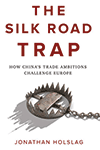Book of the week: the problems with Chinese trade
Book review: The Silk Road Trap Jonathan Holslag argues that Beijing has repeatedly outmanoeuvred Brussels by getting Europe to open its markets in return for vague promises that the Chinese will do the same.

Get the latest financial news, insights and expert analysis from our award-winning MoneyWeek team, to help you understand what really matters when it comes to your finances.
You are now subscribed
Your newsletter sign-up was successful
Want to add more newsletters?

How China's Trade Ambitions Challenge Europe
Polity Press, £14.99
We hear a lot about American complaints that China isn't playing by the rules of global trade, but Europe has much more cause to be bitter. Jonathan Holslag argues that over the last 20 years Beijing has repeatedly outmanoeuvred Brussels by getting Europe to open its markets in return for vague promises that the Chinese will do the same. Needless to say, those promises from the People's Republic have never come close to being fulfilled.
Try 6 free issues of MoneyWeek today
Get unparalleled financial insight, analysis and expert opinion you can profit from.

Sign up to Money Morning
Don't miss the latest investment and personal finances news, market analysis, plus money-saving tips with our free twice-daily newsletter
Don't miss the latest investment and personal finances news, market analysis, plus money-saving tips with our free twice-daily newsletter
China still imposes a huge number of restrictions on imports from Europe, as well as on investment by European firms into China, which are required to share intellectual property if they want to take part in projects. At the same time, China heavily subsidises its domestic firms, many of which are owned by the state, and are therefore allowed to run up huge debts, which the state-owned banks continually roll over. In some cases, Chinese firms engage in outright dumping, deliberately selling products far below the cost of production, in order to drive foreign rivals out of business.
Some people argue that although China hasn't opened up its market to the same extent as Europe, the European consumer has still benefited from a stream of cheap imports. Holslag has little time for this argument, pointing to Europe's chronic trade deficit with China, which has resulted in Europe accumulating large levels of public and private debts. Indeed, some countries, such as Greece, are now so indebted to China that they are essentially becoming Chinese colonies. He also worries that as China climbs the development ladder, producing ever more sophisticated goods, Europe is reduced to selling raw materials and agricultural products.
It's a stark warning, especially since Holslag provides a lot of data to illustrate the unequal flow of goods and capital between Europe and the Asian superpower. Still, it's hard to avoid the impression that we've heard a lot of this before 30 years ago, for example, when everyone worried about the rise of Japan, only for it to experience a "lost decade". The same could easily happen again. Chinese growth is starting to slow, and cracks are appearing in its financial system.
The Silk Road Trap is a one-sided look at the problems with Chinese trade, which dismisses any benefits. And it's a pity Holslag didn't spend more time on China's "soft power" efforts to lobby European policymakers, and the increasingly sinister co-operation between Chinese state firms and the military. Still, the book provides a powerful counterpoint to the increasingly complacent attitudes of European (and British) policymakers to a country that combines authoritarian politics with a state-directed economic system.
Get the latest financial news, insights and expert analysis from our award-winning MoneyWeek team, to help you understand what really matters when it comes to your finances.

-
 Do you face ‘double whammy’ inheritance tax blow? How to lessen the impact
Do you face ‘double whammy’ inheritance tax blow? How to lessen the impactFrozen tax thresholds and pensions falling within the scope of inheritance tax will drag thousands more estates into losing their residence nil-rate band, analysis suggests
-
 Has the market misjudged Relx?
Has the market misjudged Relx?Relx shares fell on fears that AI was about to eat its lunch, but the firm remains well placed to thrive